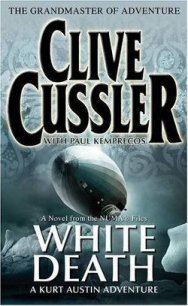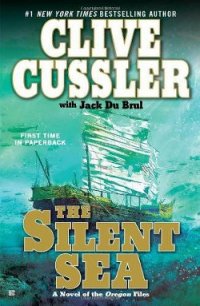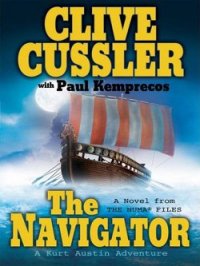Lost City - Cussler Clive (читать онлайн полную книгу .txt) 📗
He and Zavala followed Muller to a briefing room belowdecks. About thirty men and women were seated in rows of metal folding chairs drawn up in front of a large wall screen. Austin and Zavala quietly slipped into a couple of chairs in the back row. Austin recognized some of the NUMA scientists in the audience but knew only a few of the uniformed people from the armed forces and the suits from various governmental agencies charged with public security.
Standing in front of the screen was Dr. Osborne, the Woods Hole phycologist who had introduced the Trouts to the Gorgonweed menace. He was wielding a remote control in one hand and a laser pointer in the other. Displayed on the screen was a chart showing the circulation of water in the Atlantic Ocean.
"Here's where the infestation starts, in the Lost City," he said. "The Canaries' current carries the weed down past the Azores, flows westward across the Atlantic Ocean where it joins the Gulf Stream. The Gulf Stream moves northerly along the continental shelf. Eventually, it joins the North Atlantic current, which takes it back to Europe, completing the North Atlantic gyre." He swirled the red laser dot in a circle to make his point. "Any questions?"
"How fast does the Gulf Stream move?" someone asked. "About five knots at its peak. More than a hundred miles a day." "What's the present state of the infestation?" Muller asked.
Osborne clicked the remote and the circulation chart disappeared. A satellite photo of the North Atlantic took its place. An irregular yellowish band that resembled a great deformed donut ran in a rough circle around the edge of the ocean, close to the continents.
"This real-time composite satellite photo gives you an idea of the current areas of Gorgonweed infestation," Osborne said. "Now I'll show you our computer projection of the further spread." The picture changed. In the new photo the ocean was totally yellow, except for a few dark blue holes in the central Atlantic.
A murmur ran through the audience.
"How long before it gets to that stage?" Muller asked.
Osborne cleared his throat as if he were having a hard time getting the words out. "A matter of days."
There was a collective gasp at his answer.
He clicked the remote. The picture zoomed in on the eastern seaboard of North America. "This is the area of immediate concern. Once the weed reaches the shallower waters of the continental shelf, we're really in trouble. For a start, it will destroy the entire fishing industry along the east coast of the United States and Canada and northwestern Europe. We've been trying various measures of at-sea containment. I saw Mr. Austin enter the room a few minutes ago. Would you like to bring us up-to-date, Kurt?"
Not really, Austin thought as he made his way to the front of the room. He scanned the pale faces in front of him. "My partner, Joe Zavala, and I just completed an aerial survey of the picket line that has been established along the edge of the continental shelf." He described what they had seen. "Unfortunately," he concluded, "nothing made a dent."
"What about chemicals?" a government bureaucrat asked.
"Chemicals are quickly dissipated by water and wind," Austin said. "A little seeps down, and it may kill a few tendrils, but Gorgonweed is so thick that the chemical doesn't go all the way through.
We're talking about a vast area. Even if you were able to cover it you'd end up poisoning the ocean."
"Is there anything that could destroy a large area?" Muller asked.
"Sure. A nuclear bomb," Austin said, with a bleak smile. "But even that would be ineffectual with thousands of square miles of ocean. I'm going to recommend that booms be erected around major harbors. We'll try to keep our major ports clear so we can buy time."
A beefy four-star army general named Frank Kyle stood and said, "Time for what} You've said yourself that there is no defense against this stuff."
"We've got people working on genetic solutions."
The general snorted as if Austin had suggested replacing his soldiers' rifles with flowers. "Genetics! DNA stuff? What the hell good is that going to do? It could take months. Years."
"I'm open to suggestions," Austin said.
The general grinned. "Glad to hear that. I'm going to pass your suggestion about nuclear bombs along to the president."
Austin had dealt with military types when he was with the CIA and found that they were usually cautious about using force against any enemy. General Kyle was a throwback to another nuclear general, Curtis LeMay, but in a climate of fear his recommendation might prevail.
"I was not suggesting it," Austin said patiently. "As you'll recall, I said a nuclear bomb would make a relatively small dent in the weed."
"I'm not talking about one bomb," General Kyle said. "We've stockpiled thousands of them that we were going to use against the Russians. We carpet bomb the ocean, and if we run out we can borrow more from the Ruskies."
"You're talking about turning the ocean into a nuclear waste dump," Austin said. "A bombing campaign like that would destroy all ocean life."
"This weed of yours is going to kill all the fish anyhow," Kyle replied. "As you know, shipping has already been disrupted and there is a loss of billions of dollars by the hour. This stuff is threatening our cities. It's got to be stopped by any means. We've got 'clean' nukes we can use."
Heads were nodding in the audience. Austin saw that he was getting nowhere. He asked Zavala to sit in on the rest of the strategy session while he went to the bridge. A few minutes later, he was in the wheelhouse, using the ship's radiophone to call the Trouts, who were on the Sea Searcher, over the Lost City. He made quick contact with the NUMA research vessel and a crewman tracked down Paul, who had been directing a Remote Operated Vehicle (ROV) from the deck.
"Greetings from the wild weird world of Dr. Strangelove," Austin said.
"Huh?" Trout replied.
"I'll explain in a minute. How's your work going?"
"It's going," Trout said, with no real enthusiasm. "We've been running an ROV to collect samples of algae and weed. Gamay and her team are busy in the lab doing analysis."
"What's she looking for?"
"She hopes they can find something in the weed's molecular structure that might help. We've been sharing information with NUMA scientists back in Washington, and with scientific teams in other countries. How about you?"
Austin sighed. "We've tried every trick we can think of, but with no success. The offshore wind is giving us a little reprieve. But it won't be long before every harbor on the east coast will be clogged up. The Pacific is showing patches of infestation as well."
"How long do we have?"
Kurt told him what Osborne had said. He could hear Paul suck his breath in.
"Are you having any problem navigating in the stuff?" Austin asked.
"The area around the Lost City is relatively clear. This is where the infestation starts, and it thickens as it goes east and west of here."
"That may be the only clear patch in the ocean before long. You'd better plot an escape route so you don't get caught up in the weed yourself."
"I've already talked to the captain. There's a channel open south of here, but we're going to have to leave within twenty-four hours if we expect to get out. What was that you said about Strangelove?"




